Filter by

How Megaprojects Are Damaging Nigeria and How to Fix It
Since 1960, two-thirds of very large governmental projects in Nigeria have not only failed, but been abandoned mid-course. This presents a bigger failure rate than mega projects elsewhere, and yet there is no available data or analysis to help us understand the reasons behind such failures. This book provides an authoritative examination into why very large projects in Nigeria have failed so ba…
- Edition
- -
- ISBN/ISSN
- 978-3-030-96474-0
- Collation
- -
- Series Title
- -
- Call Number
- -
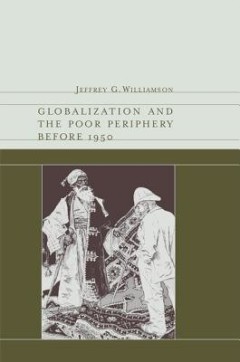
Globalization and the poor periphery before 1950
"In Globalization and the Poor Periphery before 1950 Jeffrey Williamson examines globalization through the lens of both the economist and the historian, analyzing its economic impact on industrially lagging poor countries in the nineteenth and early twentieth centuries. Williamson argues that industrialization in the core countries of northwest Europe and their overseas settlements, combined wi…
- Edition
- -
- ISBN/ISSN
- 9780262286329
- Collation
- 1 online resource (x, 189 pages) : illustrations
- Series Title
- Ohlin Lectures
- Call Number
- 362 WIL g
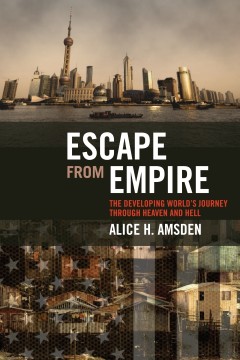
Escape from Empire: The Developing World's Journey through Heaven and Hell
In Escape from Empire, Alice Amsden argues that the more freedom a developing country has to determine its own policies, the faster its economy will grow. America's recent inflexibility - as it has single-mindedly imposed the same rules, laws, and institutions on all developing economies under its influence - has been the backdrop to the rise of two new giants, China and India, who have built e…
- Edition
- -
- ISBN/ISSN
- 9780262267113
- Collation
- 1 online resource (vi, 197 pages) :illustrations
- Series Title
- -
- Call Number
- -
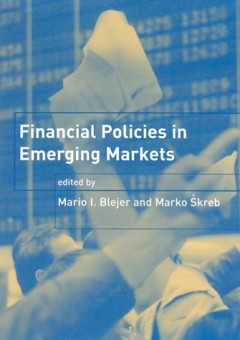
Financial policies in emerging markets
An overview of the financial vulnerability of emerging market economies and how the impact of exchange rate regimes affects this vulnerability.The 1994-1995 Mexican crisis was the first in a succession of financial crises to hit emerging markets in Thailand, Indonesia, Malaysia, South Korea, Russia, Brazil, Argentina, and Turkey. In almost all these cases, problems in the banking sector played …
- Edition
- -
- ISBN/ISSN
- 9780262268691
- Collation
- 1 online resource (vi, 259 pages) :illustrations
- Series Title
- -
- Call Number
- -
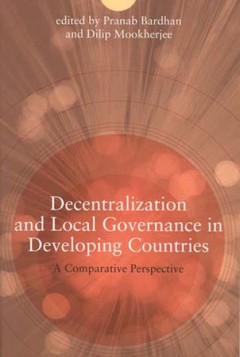
Decentralization and local governance in developing countries: a comparative …
Over the past three decades the developing world has seen increasing devolution of political and economic power to local governments. Decentralization is considered an important element of participatory democracy and, along with privatization and deregulation, represents a substantial reduction in the authority of national governments over economic policy. The contributors to Decentralization a…
- Edition
- -
- ISBN/ISSN
- 9780262267694
- Collation
- 1 online resource (vi, 363 pages)
- Series Title
- -
- Call Number
- -
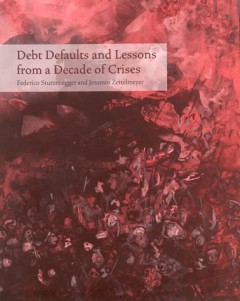
Debt Defaults and Lessons from a Decade of Crises
Providing case studies of debt defaults by Russia, Ukraine, Pakistan, Ecuador, Moldova, and Uruguay, framed by a discussion of the history, economic theory, legal issues, and policy lessons of sovereign debt crises, this work examines the facts, economic theory, and policy implications of sovereign debt crises.OCLC-licensed vendor bibliographic record.
- Edition
- -
- ISBN/ISSN
- 9780262284547
- Collation
- 1 online resource (xii, 385 pages) :illustrations
- Series Title
- -
- Call Number
- -
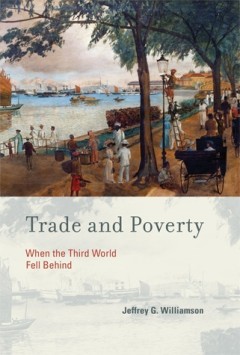
Trade and Poverty: When the Third World Fell Behind
This work explores how the rise of globalization over the past two centuries helps explain the income gap between rich and poor countries today.OCLC-licensed vendor bibliographic record.
- Edition
- -
- ISBN/ISSN
- 9780262295727
- Collation
- 1 online resource (xi, 301 pages) :illustrations
- Series Title
- -
- Call Number
- -

The unequal effects of globalization
"A look at the effects of globalization on within-country inequality and implications of policies to address this"--OCLC-licensed vendor bibliographic record.
- Edition
- -
- ISBN/ISSN
- 9780262375566
- Collation
- 1 online resource.
- Series Title
- -
- Call Number
- -
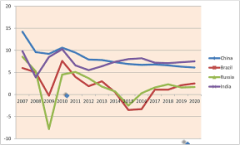
Economic Growth in Developing Countries
Economic growth across countries during the last 30 years or so has displayed 'dual' divergence between developed and developing countries, and among developing countries. The structural transformation has been either slow or of an anomalous nature. The study addresses these and suggests how they can catch-up with developed world.
- Edition
- 1
- ISBN/ISSN
- 978-1-349-55922-0
- Collation
- -
- Series Title
- -
- Call Number
- XVIII, 263
 Computer Science, Information & General Works
Computer Science, Information & General Works  Philosophy & Psychology
Philosophy & Psychology  Religion
Religion  Social Sciences
Social Sciences  Language
Language  Pure Science
Pure Science  Applied Sciences
Applied Sciences  Art & Recreation
Art & Recreation  Literature
Literature  History & Geography
History & Geography